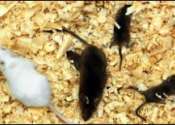'Darting' mice may hold clues to ADHD, autism and bipolar disorder
A darting mouse may hold an important clue in the development of Attention Deficit Hyperactivity Disorder (ADHD), autism and bipolar disorder, according to a study by a Vanderbilt University-led research team recently published ...
Nov 10, 2014
0
0






